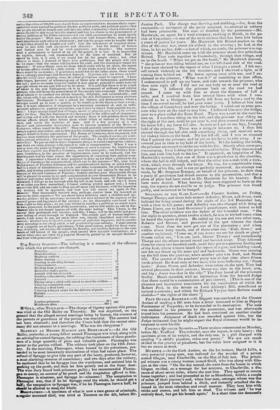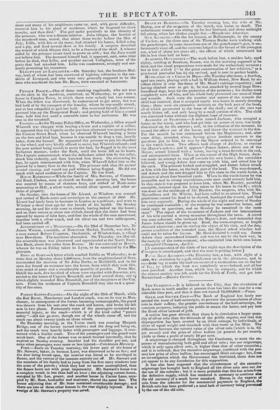Chap BAILEY Sessross.—The following is a summary of the ittriel which the prisoners are charged. offences
Burglary 3 Housebreald ng 4 Highway robbery 7 Horse stealing 1 Stealing in dwelling-houses 16 Embezzlement 3 Stealing from persons 44 Receiving stolen goods 10 Assault with intent to rob 2 Sending a threatening, letter ... 1 Larceny 202 Taking away a child with intent to steal the clothes 1 Uttering counterfeit coin Stealing a dead body Uttering a forged order for the delivery of goods Bigamy Fraud., London prisoners 44 1 309 Middlesex ditto 265 I
3VOILL, alias Tunaran D.—The charge of bigamy against this person mai tried at the Old Bailey on Thursday. He was acquitted, on the gssand that the alleged second marriage being by licence, the consent of -oarenta or guardians of the parties was essential. The consent had ateat been obtained ; and therefore the Court held that the second cerexatiny did not amount to a marriage. Who was the clergyman ?
ROBBERY AT MESSRS. MACHIN AND DEBENHAM'S.—AE the Old Bailey, yesterday, a young fellow named Flannagan was tried, along with as. accomplice named Spraggs, for robbing the warehouses of these gentlemen of a large quantity of plate and valuable goods. Flannagan was patter to the parties robbed. The robbery took place on the 12th Jam'. arc. In the morning, Flannagan, when roused by the policeman, pretended to be most innocently unconscious of what had taken place. The refusal of Spraggs to give him any part of the booty, produced, however, a mast alarming remorse of conscience; and two days after the robbery, lc confessed that he let Spraggs into the warehouse, and assisted him in porking up the goods, and then let him quietly out at the front door. Tte wise Jury found both prisoners guilty ; but recommended Fianna. gsa to mercy, on account of his youth and the temptation offered to him. Flannagan is nineteen, and Spraggs is—nineteen I The temptation to /PAnnagan was, that if be let Spraggs steal the whole, he should get a liar; the temptation to Spraggs was, if he let Flannagan have a half, he &teak! be allowed to steal, the whole.
illaskEIWAYMEN.—A specimen of what is now a rare genus of criminals, ;angular mounted thief, was tried at Taunton on the 4th, before Mr.
Justice Park. The charge was shooting and stabbing,—for, from the extraordinary resistance of the party attacked, no attempt at robbery had been practicable. The case, as detailed by the prosecutor—Mr. Hardwick, an agent for a wool company, residing at Huish, in the parish of Coomsbury—is one of the most curious that has been laid before a court of justice for years. Mr. Hardwick left Bristol market on the 21st of October last, about six o'clock in the evening ; he had, at the time, in his pocket, 450/.—a fact of which, no doubt, the prisoner was cognizant. Mr. Hardwick came up with the prisoner about five miles from Bristol. They rode together to Coomsbury, through that village, and on to the heath. " When we got on the heath," Mr. Hardwick deposed, " the prisoner was riding behind me, on the left-band side of the road. I was soon alarmed by the report of what 1 thought a pistol. I felt myself struck violently on the left shoulder, and I observed a light, as if coming from behind me. My horse sprung away with me, and I ex. claimed to the prisoner, What was it ?' or something to that effect. I endeavoured to pull up my horse, and rode towards the prisoner, who then rode right off.. 1 did not see any body on or near the road at the time. I followed the prisoner back on the road we had passed. I came up with him at about the distance of half a mile, and I received from him several blows with what I con. sidered to be a bludgeon. I nearly fell from my horse ; and by the time I recovered myself, be had gone some yards. I followed him into the village of Coomsbury and over the bridge. I called out to some per sons who vere on the road to stop him. 1 followed him over the bridge, near to a place called the Kent Road. There was a cart in the road before us. I was then riding on the left., and the prisoner was riding on. the right of the cart, until he got near it, and then crossed the road, and his horse fell ; my horse fell also. As soon as I got on my legs, I caught hold of the prisoner. There was a struggle between us. I then felt Pierced through the left side with something sharp, and received several violent blows on the head. Illy hat fell off, and I was so stunned that I quitted the prisoner, and he got on his horse to ride away. I recovered just ill time to lay hold of the bridle. Whilst holding the bridle, the prisoner attempted to strike me with his fist. Shortly after, some per sons came up. I was holding the prisoner and his horse. TI ley theitseenre& him, and took him back to the inn." It appeare.d, on inspection of Mr. Hardwick's wounds, that one of them was a pistol-shot in the shoulder, where the ball is still lodged, and that the other was a stab with a tuck. stick, whicb. went through the lungs. He was, fin' a considerable time, in danger of his life, and is not yet perfectly recovered. An attempt was made, by Mr. Sergeant Bompas, on behalf of the prisoner, to show that a party of gentlemen had drunk success to the prosecution, and that a piece of plate had been voted to Mr. Hardwick for his bravery. Both facts were denied. What bearing they were supposed to have on the case, the reports do not enable its to judge. The prisoner was found guilty, and sentenced to be hanged.
SPECIMENS OF TIIE Gann-Laws.—At Chester Assizes, on Friday, George Thorpe, and three lads named Ackerley, Shone, and Jones, were indicted for being armed during the night of the 3rd December last, with a view to kill game; and Ackerley was also charged with firing at
• James Hurst, son to Lord Grosvenor's gamekeeper, with intent to kill him. The chief evidence was the father of the wounded man. " On. the night in question about twelve o'clock, be was in his bed-room, when he heard the report Of guns. He called up his son and two other men, Roberts and Groom, and proceeded to the spot whence the shots came. More than ten men got out of the plantation ; and when within about forty -yards, one of them cried out, Halt, dress ;' and another exclaimed, 'Come on, if you dare ; we are for death or glory.' Groom called out, You are here, Master Thorpe ;' and immediately Thorpe and the others turned raund and hurried away. They followed them for about two hundred yards, until they got to a gateway leading out of the field, where witness heard the report of a gale and looking round, saw his son throw up his arms and reel backwards. Shone was running up the hill from the gateway, when another gnu was fired, and Shone fell. The nearest of the poachers' party was at that time about fifteen yards a-head. He fired once at two men, who were hallooing out, Shoot again.' Jones, Shone, and Ackerley, were taken on the spot. They had several pheasants in their pockets ; Shone was shot in the hand, arm, and hip ; Jones was shot in the side." The Jury found all the prisoners Guilty. Death recorded, with an intimation from the learned Judge that there would be a commutation of punishment. [This is one of the pleasant and instructive rencontres, for the continuance of which Sir Robert Peel, in the debate on Lord Althorp's Bill, manifested so earnest a concern ; and which Sir Richard Vyvyan fears Reform would abolish—" the rights of the chace.1
POST OFFICE ROBBERY.—G. Higgott was convicted at the Chester Assizes of stealing a 101. note from a letter intrusted to him as Deputy Postmaster of Tarporley, to be forwarded to its destination. The note was enclosed in his presence by the prosecutor, and was afterwards traced into his possession. He had been convicted on another similar indictment. Judgment of death was recorded against him, but th,e Judge intimated that he might expect the Royal clemency would be interposed to save his life.
CIIESTEII Qn MUM SESSIONS.—These sessions commenced on Monday, before Mr. Trafford. The calendar, says the report, is very heavy : the specimen given of its weight, and the only one, is a girl charged with stealing "a child's pinafore, value one penny.". We are not much skilled in the gravity of pinafores, but the value here assigned to it is but an ounce at most.
Muanan.—At the Cork Assizes, on the 1st instant, David Lillis, a very powerful young man, was indicted for the murder of a person named Glogan, near Charleville, on the 31st of July last. The principal witness was a young woman named Guill, who was along with Glo. gan at the time. "On the day named, she went from the house in which Glogan reiided, on a message for her mistress, to Charleville, a dis.. tance of about seven miles, where she met him. They agreed to return home together ; and had proceeded as far as Shandrum, within a couple. of miles of their journey's end, when four men, amongst whom Was the prisoner, jumped from behind a ditch, and instantly attacked the de.. ceased in the most relentless and cruel, manner. They beat him with sticks and stones, and left him as dead. The witness said he was entirely dead, but got his breath again.' In a short time the deceased's sister and many of his neighbours came up, and, with great difficulty, removed him to his place of residence, where he lingered for three months, and then died." The girl spoke positively to the identity of the prisoner, who was a distant relation. John °logo'', the brother of the murdered man, stated, that about three weeks before the 31st of July, Lillis, with five or six more, had attacked his house, killed a dog and a pig, and fired several shots at his family. A surgeon described the wound of which Glogan died, to he a fracture of the skull. A witness called by the prisoner swore hard to prove an alibi ; but the Jury would not believe him. The deceased himself had, it appeared, said, some time before he died, that Lillis, and another naraed Callaghan,. were of the party that had attacked him. Lillis was condemned, strongly and earnestly protesting his innocence. EXECUTION AT LaamcasTER.—On Saturday last, the brothers Millvay, both of whom had been convicted of highway robberies in the outskirts of Liverpool, and who were very generally supposed to be the men who murdered the late Mr. Burn, were executed at Lancaster.



























 Previous page
Previous page